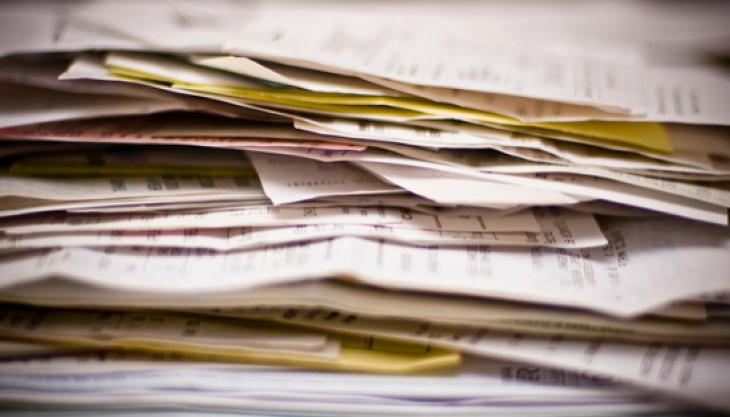How Long Should You Keep Your Bankruptcy Paperwork? Must-Read Info If You’re Considering Chapter 7 or 13 in North Carolina
Submitted by Rachel R on Tue, 01/15/2019 - 9:53am

Should you keep or toss your paperwork?
Image Source: Flickr CC User Camilo Rueda Lopez
It seems like life is full of papers we don’t need – junk mail, receipts for things we won’t return, school papers, paycheck stubs. For a society that’s trending toward paperless, we’ve got a long way to go. But what about bankruptcy papers, including your petition, discharge, and schedules? How long should you keep those? Here’s a hint – they are as important as your will!
Rule of Thumb for Storing Important Papers
When it comes to tax returns, keeping the return plus supporting documents for three years after filing is a good rule of thumb. If you’re late paying the tax, keep the return two years from the date you paid or three from when you filed (whichever is later).
When it comes to receipts, if there’s a warranty, keep the receipt until the warranty runs out. Otherwise, for anything you might need to take back, just keep the receipt until the return period is up. If you’ll deduct the item as a tax expense, follow tax rules.
Even though your bankruptcy petition, documents, and discharge seem like financial documents that could fall under the same timeline as your tax docs, they are NOT. They are far more important and should be kept indefinitely.
Why Keep Bankruptcy Papers Forever?
Creditors might come back and try to collect on a debt that was part of the bankruptcy. Being able to show the debt was part of your Chapter 7 or Chapter 13 can quickly put a stop to collections for debts you don’t legally owe.
Also, creditors sell off bad debt in chunks of thousands (or hundreds of thousands) of accounts. Bad debt buyers are often aggressive and unscrupulous, and having your bankruptcy documents on-hand can be the fastest way to shut them down and keep old items from popping back up on your credit report.
In some states, when applying for a professional license, you may also need to prove that your bankruptcy was discharged as part of the screening process. Having certified copies of your paperwork can prevent a delay in your licensure.
Which Bankruptcy Documents Should You Keep?
The short answer? All of them. Getting copies of your bankruptcy documents from your lawyer can take time, especially if your case is older and the copies are archived off-site. Getting bankruptcy documents from the Federal courts can be costly and time-consuming as well.
It’s best to keep your own archive on hand so you don’t have to scramble to get copies from these sources in case something crops up that requires you to produce the papers. These are the documents you need to keep:
- Credit counseling certificates (both pre-filing and pre-discharge courses)
- Receipts for court filing fees
- Bankruptcy petition, supporting schedules, and exhibits
- Statements, disclosures, and declarations
- Mailing list of creditors
- Proof of income and social security proof filed with petition
- Electronic filing declaration (if filed electronically – and most cases are)
- Means calculation (if required) and supporting docs
- Notices from the bankruptcy court (and your attorney or Trustee)
- Final bankruptcy discharge
This is pages and pages of information. The petition alone should be around 70-80 pages once you factor in the schedules and supporting documents. Keep every page. Get a box or large envelope and put them all inside. It’s better to save too much than too little.
Put them in a safe place, too – like where you keep your will and other important financial documents – and just leave them there. If you never need them, good. If you do, you know where to find them immediately.
To find out more about the benefits of North Carolina bankruptcy, contact the Law Offices of John T. Orcutt. Call +1-833-627-0115 for a free no-obligation North Carolina bankruptcy consultation at one of our locations in Raleigh, Durham, Fayetteville, Wilson, Greensboro or Wilmington. Get the financial peace of mind you deserve.
Debts Hurt! Got debt? Need help? Get started below!
Serving All of North Carolina
- Bankruptcy Attorneys Raleigh NC (North)
- Bankruptcy Attorney Fayetteville NC
- Bankruptcy Attorney Durham NC
- Bankruptcy Attorneys Wilson NC
- Bankruptcy Attorneys Greensboro NC
- Bankruptcy Attorneys Southport NC
- Bankruptcy Attorneys Wilmington NC
Bankruptcy Attorneys Raleigh NC (North)
6616 Six Forks Rd #203 Raleigh, NC 27615 North Carolina
Tel: (919) 847-9750

Bankruptcy Attorney Fayetteville NC
2711 Breezewood Ave Fayetteville, NC 28303 North Carolina
Tel: (910) 323-2972

Bankruptcy Attorney Durham NC
1738 Hillandale Rd Suite D Durham, NC 27705 North Carolina
Tel: (919) 286-1695


Bankruptcy Attorneys Greensboro NC
2100 W Cornwallis Dr. STE O Greensboro, NC 27408 North Carolina
Tel: (336) 542-5993

Bankruptcy Attorneys Southport NC
116 N Howe St. Suite A Southport, NC 28461 North Carolina
Tel: (910) 218-8682

Bankruptcy Attorneys Wilmington NC
116 N. Howe Street, Suite A Southport, NC 28461 North Carolina
Tel: (910) 447-2987
